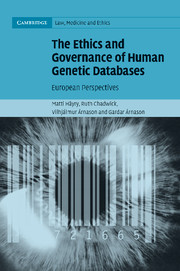1 - Introduction: some lessons of ELSAGEN
Published online by Cambridge University Press: 05 August 2012
Summary
The investigation of ELSAGEN (Ethical, Legal and Social Aspects of Human Genetic Databases: A European Comparison), which was funded by the European Commission from 2002 to 2004, was occasioned by plans to construct population-wide databases in the four participating countries: deCODE's database in Iceland, the Estonian Genome Project, UK Biobank and Medical Biobank of Umeå in Sweden. Interdisciplinary research teams – with scholars and students from philosophy, law and sociology – were formed at ethics centres of six universities in these four countries: the University of Iceland, which coordinated the project, Tartu University in Estonia, Lund University in Sweden and the Universities of Central Lancashire, Lancaster and Oxford in the United Kingdom. This research also benefited from the network ‘The Ethics of Genetic and Medical Information’, financed by the Nordic Academy of Advanced Study (NorFA, now NordForsk) from 2002 to 2006.
This research, therefore, concerns databases which are new or under construction and which will collect information specifically for the intended multi-disease and population health research. A human population genetic database is a collection of genetic, medical and, in some cases, genealogical data from a large number of people, arranged in a systematic way so as to be searchable. As a rule, such databases are intended to provide data for research in human genetics and medicine, exploring interaction between genes, lifestyle, environmental factors and health and diseases.
- Type
- Chapter
- Information
- The Ethics and Governance of Human Genetic DatabasesEuropean Perspectives, pp. 1 - 8Publisher: Cambridge University PressPrint publication year: 2007

